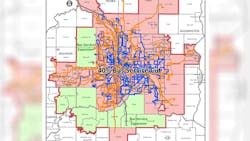Impacts of House Transportation Bill Would be Felt Across Entire Twin Cities Region
The Metropolitan Council has provided additional information about the impacts of the House Transportation Omnibus Bill (HF 861). As Council Chair Adam Duininck testified at a public hearing on April 20, additional review of the bill reveals it will severely impact all Twin Cities metro transit service, including bus, Northstar, and Transit Link.
“The proposed cuts to transit included in the House proposal would devastate the Twin Cities metro region,” said Council Chair Duininck. “As we continue to review possible scenarios, it is alarming the magnitude of cuts that would be required. People across the region would be forced to pay more for a service that will provide far less in return. For some commuters, their route to and from work could disappear. In particular, transit riders in the suburbs will feel the greatest impact — these reductions in service could mean the loss of the only public transit they have access to. Now is the time for the Twin Cites metro region to be expanding transit options, not slashing them.”
Impact of House proposed cuts on transit service
- Balloons existing transit deficit from $74 million to $140 million
- All bus routes operated by Metro Transit (express and local) affected - either reduced or eliminated
- 20-70 of 151 routes could be eliminated
- Thousands of scheduled bus trips could be eliminated
- Red Line Bus Rapid Transit service reduced
- Northstar weekend service eliminated
- Projected 20-25 percent ridership loss system-wide (50,000 to 70,000 daily rides lost)
More on Transit Link elimination
Transit Link dial-a-ride service is a discretionary program the Council provides in areas where regular-route transit service is not available or has limited operating hours. This includes communities that receive regular route and express service from suburban transit providers. The service operates across the entire seven-county metro region, including outside the boundaries of the Transit Capital Levy District.
Under the proposed bill, Transit Link would be eliminated entirely. For residents who live outside the taxing boundaries, they currently can use Transit Link to connect to the regional transit network. Transit Link provides more than 300,000 rides annually across the region. Although Transit Link is open to the general public, seniors and persons with disabilities make up a significant share of Transit Link riders. In some cases, Transit Link acts as an extension of Metro Mobility in areas beyond the Metro Mobility service area. Elimination of Transit Link would mean residents in the following communities outside the taxing district would lose their sole transit service:
- In Anoka County: St. Francis, Nowthen, Oak Grove, Andover, East Bethel, Ham Lake, Linwood Township, Bethel
- In Washington County: Scandia, Hugo, Grant, May Township, Marine on St. Croix, Stillwater Township, West Lakeland Township, Afton, Denmark Township, Lakeland Shores, Lakeland, Lake St. Croix Beach, St. Mary’s Point
- In Dakota County: Nininger Township, Hastings, Ravenna Township, Marshan Township, Douglas Township, Vermillion City/Township, Hampton City/Township, Randolph City/Township, Empire Township, Farmington, Castle Rock Township, Eureka Township, Greenvale Township, Waterford Township, Sciota Township, Miesville, New Trier
- In Scott County: Credit River Township, Elko New Market, New Market Township, Spring Lake Township, Cedar Lake Township, Jackson Township, Louisville Township, Sand Creek Township, Jordan, St. Lawrence Township, Belle Plaine City/Township, Blakeley Township, Helena Township, New Prague
- In Carver County: Carver, Hollywood Township, Watertown City/Township, New Germany, Camden Township, Waconia City/Township, Victoria, Dahlgren Township, Cologne, Benton Township, Norwood Young America City/Township, Hamburg, Hancock Township, San Francisco Township, Mayer, Laketown Township
- In Hennepin County: Dayton, Rogers, Hanover, Corcoran, Medina, Loretto, Greenfield, Rockford, Independence, Minnetrista, St. Bonifacius
In 2016, the Metropolitan Council provided more than 100 million trips. More than 82 million of those rides were Metro Transit bus, light rail, and Northstar commuter service. Ridership has continued to grow, with an average of nearly 300,000 weekday rides.
80 percent of riders are going to work or school; nearly 40 percent of downtown Saint Paul and Minneapolis workers use transit. More than 15,000 Park & Ride spaces across the region serve commuters who ride a bus.
Governor Dayton’s proposed half-cent sales tax for the metro region would pay for the necessary growth in all these transit services, providing sustainable, reliable funding into the future.




